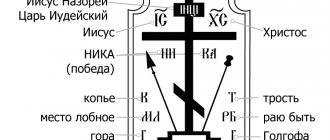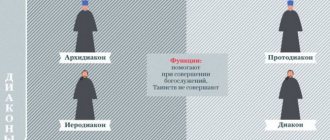On theological education for the laity
IF YOU CALL FOR KNOWLEDGE AND CALL FOR REASON;
IF YOU SEEK HIM LIKE SILVER,
AND LOOK FOR HIM AS A TREASURE,
THEN YOU WILL UNDERSTAND THE FEAR OF THE LORD AND
YOU WILL FIND KNOWLEDGE OF GOD.
(Proverbs of Solomon 2:3-5)
The history of theological education is quite ancient. Education for everyone, not just clergy and church officials, was a prerequisite for a person to gain the right to call himself a Christian. People received spiritual education, containing the truths of faith and an understanding of the personal path of a Christian, during public conversations. These were not just 1-4 conversations with those wishing to be baptized. This was a whole period in a person’s life when he gradually entered the life of the Church, when he consciously prepared for a new life. In some cities of the Roman Empire (Edessa, Alexandria...) there were even catechetical schools.
Gradually, the practice of announcement became more formal and was even partially lost. People, mostly baptized from childhood, had to be instructed in the faith by their parents - this is how theological knowledge was passed on from generation to generation, preserving both living faith and prejudices and distortions accumulated by many generations. but there was another form of enlightenment - the sermons of the priest in the temple. But, since the level of education of the priests was very different, their parishioners, accordingly, had different ideas about faith. Of course, the human soul strives for God, and this was enough for many people so that, although they were not well taught people, they were enlightened by Christ himself.
In Russia, spiritual education was received mainly by clergy and clergy in monasteries, through independent reading of books, when these books became more accessible. Systematically organized spiritual education begins to appear in the 16th century. in Ukraine, where the fraternal schools that existed there became the basis of the Kiev-Mohyla Academy. At the end of the 17th century. The Slavic-Greek-Latin Academy is being created in Moscow, which today we know as the Moscow Theological Academy.
In the next century, religious educational institutions began to open in Russia at bishops' houses. They later became known as seminaries. The word “seminary” itself is borrowed through the Polish seminarium from Lat. sēminārium “planting place”: sēmen “seed”. Seminaries were not just educational, but educational institutions for young men. Later, the leading seminaries were transformed into theological academies, and into modern ones. XIX century A three-level spiritual education arose (theological school, seminary, academy). It is interesting that teaching was conducted in Latin until the gradual transition to Russian in the 19th century.
However, seminaries did not provide only spiritual education. Their programs included general education sciences (as in a classical gymnasium). Seminarians who completed the course could do something else or enroll in another educational institution. But the best of them became clergymen, became priests, or took the places of teachers and overseers in theological educational institutions.
What about the laity? They could attend parochial and Sunday schools, study the Law of God in the gymnasium, listen to sermons and study independently. The traditions of catechetical conversations were lost, and systematic spiritual education was available only to those wishing to devote themselves entirely to service in the Church or to the children of clergy.
Nowadays the situation has changed. Today, not only clergy, but also laity have the opportunity to receive theological education, and there are many who want to take advantage of this opportunity. But the question arises: why should church parishioners study theology? Isn’t it enough to believe in God, know the Creed, attend services, pray, read the Holy Scriptures, the works of the Holy Fathers? We know that many saints sometimes had no education at all.
Indeed, the uneducated (in our understanding) saints had a path of direct knowledge of God, they had heartfelt faith and trust in God. However, among them there were also those who, having the mentioned gifts, were educated, and knowledge did not hinder him, but helped him find the way to God. We remember that the Lord himself called on his disciples to teach and enlighten the nations.
As noted by Ig. Cyprian (Yashchenko) today there is a special problem: most of the people are baptized, but not enlightened. Meanwhile, knowledge of God is the direct purpose of the human mind. Through studying the experience of the Church (and this is theological knowledge), a person develops a “crystalline lattice on which faith strengthens and becomes more effective” (Ig. Cyprian).
According to Patriarch Kirill, people need theological education, regardless of whether they are going to work in a church or do something else. This education allows a person to better understand the truths of faith and to correctly tell others about them. “The importance of theological education is not so much that the student, thanks to it, experiences personal spiritual growth, but that by studying theology and related sciences, he learns to talk about his faith” (A. Mitrofanov, pror. IDS).
Previously, theological education was mainly available to men (usually those whose lives were in some way connected with service in the Church). Can an Orthodox woman today strive to receive such an education? Not only can, but also must (priest Viktor Kobzov). We remember that the Savior himself spoke secret words when addressing women. Today women work in churches and carry out various obediences in parishes. It is to a woman that it is easier for a person who comes to the temple for the first time to turn for help. The mother is mainly responsible for raising children. Thus, theological education for women today is “not a luxury, but a necessity,” and spiritually educated women today should participate in the life of the Church.
Theological education in the courses at the Don Theological Seminary today can be obtained by any person of the Orthodox faith who is ready to work a little on the path of knowledge and has a desire to use the acquired knowledge both for their own internal development and for the benefit of those who are at the beginning of the Christian path.
Should an Orthodox girl put off her marriage in order to get a higher education? How necessary is higher education for an Orthodox woman?
– In my opinion, if young people are in a relationship and the relationship has been so long that the time has come to get married, they should get married. Of course, marriage comes before education. It's like the moment of birth - if a child needs to be born, he must come on time. But if a woman carries it to term, then there may be some kind of pathology later. In our case, a protracted relationship can lead to sin or breakup. Both are sad.
Therefore, if you are studying and do not plan to get married before the end of your studies, it is better not to start unnecessary romances at all. Study, study like that.
To be fair, it should be said that I know of more than one very successful example of creating a family while both or one of the spouses were studying. And the families developed wonderfully, and, in the end, they received an education. Sometimes starting a family can be combined with getting an education.
Again, it is human nature to change. And if today you decided not to get married until the end of your studies, and tomorrow you met a person after your heart, who also reciprocated your feelings, what could stop you from changing your decision and creating a strong, God-blessed family?
As for the need for higher education for a woman, I believe that it is good for a modern woman to be educated. Education in our time is, to some extent, a woman’s safety. If suddenly something goes wrong and the marriage breaks down for some reason, then at least the woman will have a profession and she will be able to feed herself.
It's my personal opinion. But this does not mean that I cannot understand a girl who decided to devote herself to her family, children, and simultaneously engage in some kind of applied arts. In the end, all people are different and the Lord leads everyone in his own way. Among the saints of our Church there was a place for both the highly educated Saint Basil the Great and, in all likelihood, the completely uneducated Mary of Egypt. Joseph the Betrothed, in whose house Jesus Christ spent his childhood and adolescence, was a simple carpenter.
It’s the same in everyday life. There are people who are eager to receive education: they attend courses, defend dissertations, receive diplomas, certificates, certificates. There are people who do not care about diplomas at all, and they are happy to educate themselves; fortunately, we now have unprecedentedly broad opportunities in the field of access to information. Some people are quite happy with their simple and uncomplicated family life, and their life skills are quite enough for them to live a peaceful and happy life.
Education gives a person a broad view of the world, the ability to systematize processes, to learn and teach others. But it should not turn into an end in itself: education for education’s sake. I think no one will argue with the fact that the best teacher is life. And the important thing is not whether you get an education or not, but whether you find your and only your path, and whether, with God’s help, you will move along it in the direction of eternal life.
Priest Alexy Malyukov
We have a request for you...
The articles on our website cover all parishes of the Gagauz autonomy. To continue the fruitful operation of the site, we need your help!
Please support the website "Orthodox Gagauzia" .
You can send us any donation to keep the site running. We can't do it without your help! Donate
The Orthodox Church on loans: attitude, opinion and answers to frequently asked questions
Credit and church are difficult to compatible concepts. Wrong approaches to making a living based on modern financial opportunities have placed most Christians in a dangerous situation. One part of the believers owed money, trying to make money on rising interest rates, while others fell into a money pit, borrowing and buying things on credit.
The desire to get rich makes Orthodox people forget about the most important biblical principles that help them avoid such troubles and become financially stable.
Christianity and loans
When we look at the history of the Christian religion, we see that the followers of the Messiah came from both poverty and royal families. The Church gives the comprehensive right of salvation to everyone, regardless of their position. Christianity itself has a religious view of the problems of material values and teaches people to free themselves from the power of wealth and luxury. It is important that the believer understands the temporality of earthly existence.
Two basic Christian theses about finances are found in the list of the ten most important commandments.
- The first principle says that it is forbidden to appropriate what does not belong to you. The Apostle Paul authoritatively defends his statement and gives useful advice: “Do not steal if you have stolen before, but rather engage in honest work.”
- The second principle is the statement “Always be happy with what you have in the present, and do not covet someone else’s.” The New Testament adds to this judgment that to be godly and contented is tremendous wealth.
About other sins:
Based on the stated principles, Orthodox people are obliged to live within their means and remain satisfied with their own situation. This approach shapes the Church’s attitude towards loans. Orthodoxy prohibits borrowing money for things that you can easily do without.
There is nothing reprehensible in wealth and luxury if a person has it all from the beginning, or by earning it through honest labor. If you have to borrow money for this, take things on credit, rob the Almighty without donating to the needs of the monasteries - this is real sinfulness. Such people use stolen property and do it because they want to live even better.
An Orthodox person must remember: the Lord gives his children various material support, because it is He who determines the life goal for everyone.
In some situations, the Holy Scriptures allow the right to ask for financial assistance and take out a loan. This applies to life emergencies. In conditions of dire need, a person asks for the bare necessities and takes as much as he can give. If help is refused, it is regarded from a position of pride and is harshly criticized.
Important! The Orthodox tradition allows devotees to live in material prosperity if the demon of greed is not in the mind of the believer. When a person has a good, honest income, this is regarded as a divine blessing. It is necessary to thank the Almighty Father for the fact that work is valuable and adequately paid.
How to lend
The Bible contains a whole group of specialized texts on this topic. The apostolic epistles concern the aspect of helping those people who are truly doomed to need.
- Scripture mentions: one should give to those who ask and not refuse those who want to receive credit. A believer should not avoid communication and friendship with people in need.
- The Bible clearly says: if you lend money, you don’t have to wait for it to be returned. An Orthodox person must have great patience and be prepared to suffer some loss.
- Holy Scripture prohibits taking any interest from debtors. Such cases are viewed from a position of mercy, and not as a means of selfish gain.
These principles do not apply to situations where a person is borrowing for something non-essential or to develop a profitable business. The Bible prohibits giving money for non-essential items. By giving in this case, the believer becomes an accomplice to a great sin, the desire to take possession of what the Lord did not allow to have naturally.
If there is a loan for the needs of a profitable business, a kind of joint venture is obtained. This position is acceptable when one party has certain experience and the other has money. Pooled resources make it possible to produce something and make a fair profit.
The person who invested the money receives income depending on the role played by the finances he contributed. If a believer wants to contribute a certain amount to the development of a business, it is necessary to take into account and consider the effectiveness of the enterprise. Too easy an income promises great disappointments and troubles.
On a note! The Orthodox Church allows people to use financial instruments that do not spoil his personality and do not embitter him.
The attitude of believers towards loans is twofold: some get the opportunity to use the things they want in the present, others consider them to be bondage, provoking heavy thoughts about payments. Before taking out a loan, you should rationally assess your financial condition and moral readiness for psychological difficulties.
Read about the Orthodox faith:
Additional considerations
The skepticism about all entrepreneurship and credit in Russia is not difficult to understand. The country experienced a difficult economic situation in the 90s, which was characterized by the earning of large fortunes through criminal motives. During this period, a colossal stratification of society arose, where enormous wealth coexists with extreme poverty.
This negative experience radically undermined the population’s attitude to the possibilities of any private enterprise. However, a believer always remains a true Christian, even when doing business.
There are types of entrepreneurship that are not associated with the desire to get rich. For example, charity is a matter that requires special professionalism and specific skills. Volunteering is a “business” based on the desire to do something good and useful for others.
An honest entrepreneur does not spend money on his own enrichment and satisfaction of various lusts. He directs these funds to modernize production, create favorable working conditions for workers, and also to rationally develop infrastructure. Successful entrepreneurs support schools and hospitals and invest money in scientific research.
The Church denies any activity the purpose of which is to obtain finances by deception. Such a desire is called a crime, which entails appropriate punishment. The Orthodox tradition does not recognize the gambling business, which grows on human passions and weaknesses. The very fact of participating in such adventures makes our soul vulnerable.
If a person leads a life of crime, makes money by lying, gives loans at high interest rates and deceives investors, he brings upon himself enormous problems, losing more than he gains. Such an individual is obliged to repent and say goodbye to the ignoble path forever. In addition, he must compensate everyone he deceived.
On a note! The wise King Solomon pointed out that the Lord will definitely reward the one who does good to the needy. Therefore, everyone is obliged to forget about their own benefit and bring good to the environment.
The issue of lending in the Orthodox tradition is considered from a moral perspective. Taking money is allowed only in extreme cases, only for what is necessary. Wealth and business are not condemned if the believer has the goal of doing good deeds. The Church encourages honest work and wise financial investment.
What does seminary mean?
Seminary (from the Latin ... seminarium - “breeding ground”) - an educational institution for the training of Christian clergy.
Interesting materials:
How to find people for the clan here? How to find a person's location by VKontakte id? How to find another person's Instagram QR code? How to find a person’s records on VK? How to write to a person on Instagram without following? How to write a person's name in a contact? How to write a death notice? How to write an SMS to the person who blocked you? How to write on WhatsApp to a person who is not in your contacts? How to write a statement against a person about theft?









